SBM3202: Leadership and Governance Article Review Report
VerifiedAdded on 2022/09/14
|7
|1409
|32
Report
AI Summary
This report presents a detailed review of four articles related to leadership and its various facets. The first article examines the relationship between CEO overconfidence, leadership ethics, and institutional investors, emphasizing the importance of ethical business practices and corporate governance. The second article delves into the impact of ethical leadership on group learning behavior, exploring the mediating influences of group ethical conduct, justice climate, and peer justice. The third article investigates the leader-follower dyad, analyzing the link between leader and follower perceptions of transformational leadership and its effects on job satisfaction and organizational performance. Finally, the fourth article offers a systematic review of generational diversity in the workplace, specifically within the hospitality context, highlighting the challenges and opportunities presented by diverse generational perspectives. Each article is summarized and analyzed, followed by a discussion of limitations and potential areas for future research. The report provides a comprehensive overview of current research in the field of leadership, offering valuable insights into key themes and emerging trends.
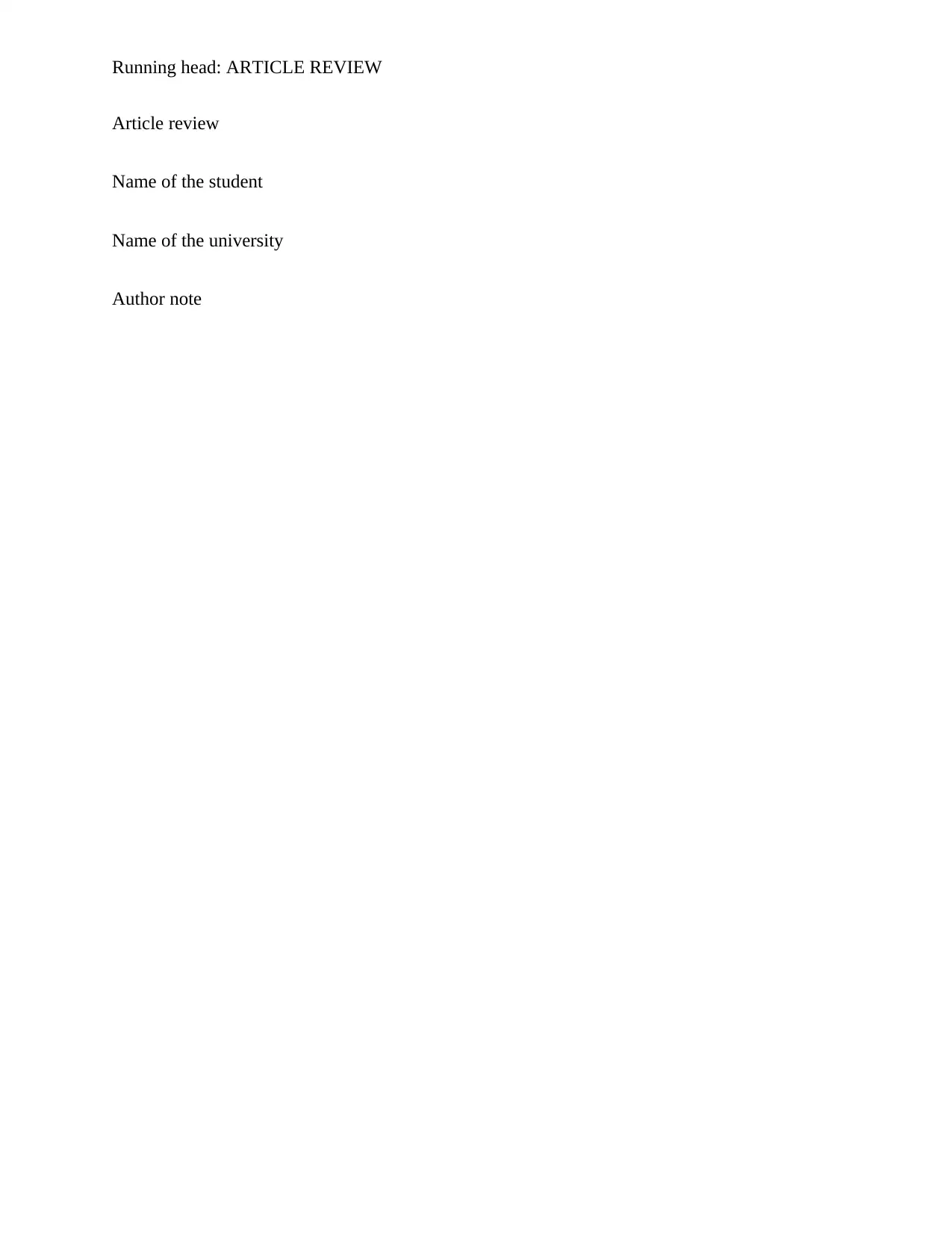
Running head: ARTICLE REVIEW
Article review
Name of the student
Name of the university
Author note
Article review
Name of the student
Name of the university
Author note
Paraphrase This Document
Need a fresh take? Get an instant paraphrase of this document with our AI Paraphraser
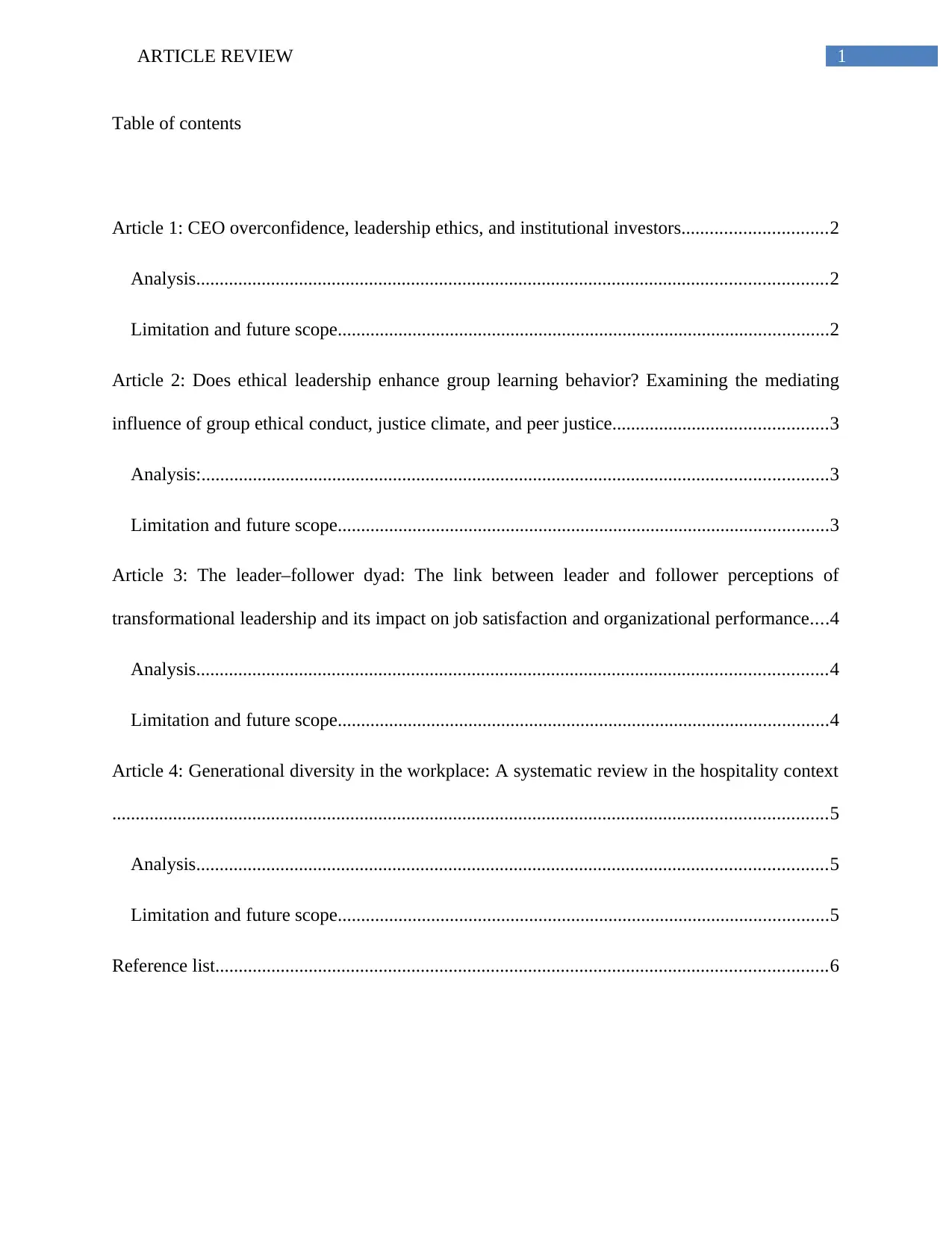
1ARTICLE REVIEW
Table of contents
Article 1: CEO overconfidence, leadership ethics, and institutional investors...............................2
Analysis.......................................................................................................................................2
Limitation and future scope.........................................................................................................2
Article 2: Does ethical leadership enhance group learning behavior? Examining the mediating
influence of group ethical conduct, justice climate, and peer justice..............................................3
Analysis:......................................................................................................................................3
Limitation and future scope.........................................................................................................3
Article 3: The leader–follower dyad: The link between leader and follower perceptions of
transformational leadership and its impact on job satisfaction and organizational performance....4
Analysis.......................................................................................................................................4
Limitation and future scope.........................................................................................................4
Article 4: Generational diversity in the workplace: A systematic review in the hospitality context
.........................................................................................................................................................5
Analysis.......................................................................................................................................5
Limitation and future scope.........................................................................................................5
Reference list...................................................................................................................................6
Table of contents
Article 1: CEO overconfidence, leadership ethics, and institutional investors...............................2
Analysis.......................................................................................................................................2
Limitation and future scope.........................................................................................................2
Article 2: Does ethical leadership enhance group learning behavior? Examining the mediating
influence of group ethical conduct, justice climate, and peer justice..............................................3
Analysis:......................................................................................................................................3
Limitation and future scope.........................................................................................................3
Article 3: The leader–follower dyad: The link between leader and follower perceptions of
transformational leadership and its impact on job satisfaction and organizational performance....4
Analysis.......................................................................................................................................4
Limitation and future scope.........................................................................................................4
Article 4: Generational diversity in the workplace: A systematic review in the hospitality context
.........................................................................................................................................................5
Analysis.......................................................................................................................................5
Limitation and future scope.........................................................................................................5
Reference list...................................................................................................................................6
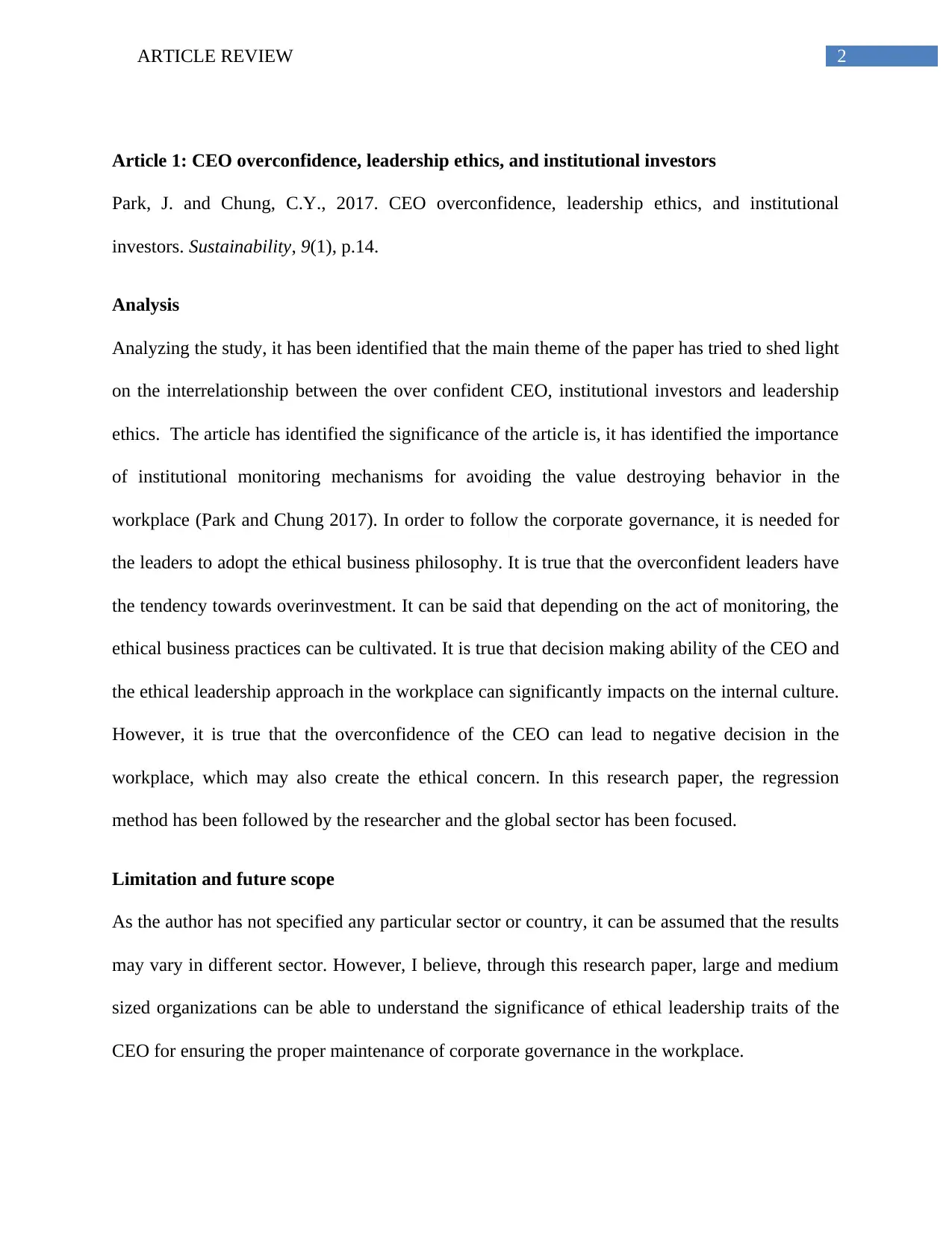
2ARTICLE REVIEW
Article 1: CEO overconfidence, leadership ethics, and institutional investors
Park, J. and Chung, C.Y., 2017. CEO overconfidence, leadership ethics, and institutional
investors. Sustainability, 9(1), p.14.
Analysis
Analyzing the study, it has been identified that the main theme of the paper has tried to shed light
on the interrelationship between the over confident CEO, institutional investors and leadership
ethics. The article has identified the significance of the article is, it has identified the importance
of institutional monitoring mechanisms for avoiding the value destroying behavior in the
workplace (Park and Chung 2017). In order to follow the corporate governance, it is needed for
the leaders to adopt the ethical business philosophy. It is true that the overconfident leaders have
the tendency towards overinvestment. It can be said that depending on the act of monitoring, the
ethical business practices can be cultivated. It is true that decision making ability of the CEO and
the ethical leadership approach in the workplace can significantly impacts on the internal culture.
However, it is true that the overconfidence of the CEO can lead to negative decision in the
workplace, which may also create the ethical concern. In this research paper, the regression
method has been followed by the researcher and the global sector has been focused.
Limitation and future scope
As the author has not specified any particular sector or country, it can be assumed that the results
may vary in different sector. However, I believe, through this research paper, large and medium
sized organizations can be able to understand the significance of ethical leadership traits of the
CEO for ensuring the proper maintenance of corporate governance in the workplace.
Article 1: CEO overconfidence, leadership ethics, and institutional investors
Park, J. and Chung, C.Y., 2017. CEO overconfidence, leadership ethics, and institutional
investors. Sustainability, 9(1), p.14.
Analysis
Analyzing the study, it has been identified that the main theme of the paper has tried to shed light
on the interrelationship between the over confident CEO, institutional investors and leadership
ethics. The article has identified the significance of the article is, it has identified the importance
of institutional monitoring mechanisms for avoiding the value destroying behavior in the
workplace (Park and Chung 2017). In order to follow the corporate governance, it is needed for
the leaders to adopt the ethical business philosophy. It is true that the overconfident leaders have
the tendency towards overinvestment. It can be said that depending on the act of monitoring, the
ethical business practices can be cultivated. It is true that decision making ability of the CEO and
the ethical leadership approach in the workplace can significantly impacts on the internal culture.
However, it is true that the overconfidence of the CEO can lead to negative decision in the
workplace, which may also create the ethical concern. In this research paper, the regression
method has been followed by the researcher and the global sector has been focused.
Limitation and future scope
As the author has not specified any particular sector or country, it can be assumed that the results
may vary in different sector. However, I believe, through this research paper, large and medium
sized organizations can be able to understand the significance of ethical leadership traits of the
CEO for ensuring the proper maintenance of corporate governance in the workplace.
⊘ This is a preview!⊘
Do you want full access?
Subscribe today to unlock all pages.

Trusted by 1+ million students worldwide
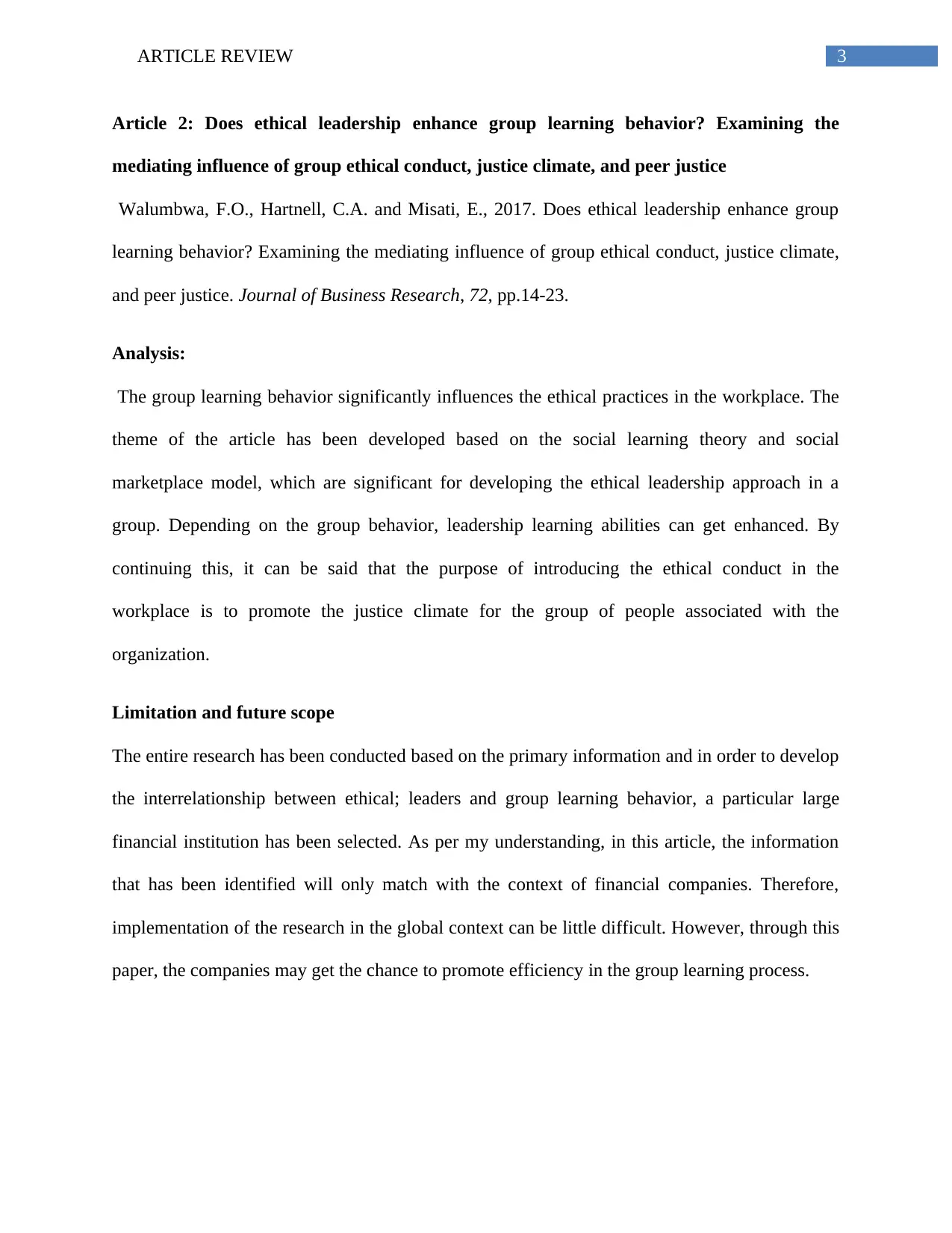
3ARTICLE REVIEW
Article 2: Does ethical leadership enhance group learning behavior? Examining the
mediating influence of group ethical conduct, justice climate, and peer justice
Walumbwa, F.O., Hartnell, C.A. and Misati, E., 2017. Does ethical leadership enhance group
learning behavior? Examining the mediating influence of group ethical conduct, justice climate,
and peer justice. Journal of Business Research, 72, pp.14-23.
Analysis:
The group learning behavior significantly influences the ethical practices in the workplace. The
theme of the article has been developed based on the social learning theory and social
marketplace model, which are significant for developing the ethical leadership approach in a
group. Depending on the group behavior, leadership learning abilities can get enhanced. By
continuing this, it can be said that the purpose of introducing the ethical conduct in the
workplace is to promote the justice climate for the group of people associated with the
organization.
Limitation and future scope
The entire research has been conducted based on the primary information and in order to develop
the interrelationship between ethical; leaders and group learning behavior, a particular large
financial institution has been selected. As per my understanding, in this article, the information
that has been identified will only match with the context of financial companies. Therefore,
implementation of the research in the global context can be little difficult. However, through this
paper, the companies may get the chance to promote efficiency in the group learning process.
Article 2: Does ethical leadership enhance group learning behavior? Examining the
mediating influence of group ethical conduct, justice climate, and peer justice
Walumbwa, F.O., Hartnell, C.A. and Misati, E., 2017. Does ethical leadership enhance group
learning behavior? Examining the mediating influence of group ethical conduct, justice climate,
and peer justice. Journal of Business Research, 72, pp.14-23.
Analysis:
The group learning behavior significantly influences the ethical practices in the workplace. The
theme of the article has been developed based on the social learning theory and social
marketplace model, which are significant for developing the ethical leadership approach in a
group. Depending on the group behavior, leadership learning abilities can get enhanced. By
continuing this, it can be said that the purpose of introducing the ethical conduct in the
workplace is to promote the justice climate for the group of people associated with the
organization.
Limitation and future scope
The entire research has been conducted based on the primary information and in order to develop
the interrelationship between ethical; leaders and group learning behavior, a particular large
financial institution has been selected. As per my understanding, in this article, the information
that has been identified will only match with the context of financial companies. Therefore,
implementation of the research in the global context can be little difficult. However, through this
paper, the companies may get the chance to promote efficiency in the group learning process.
Paraphrase This Document
Need a fresh take? Get an instant paraphrase of this document with our AI Paraphraser
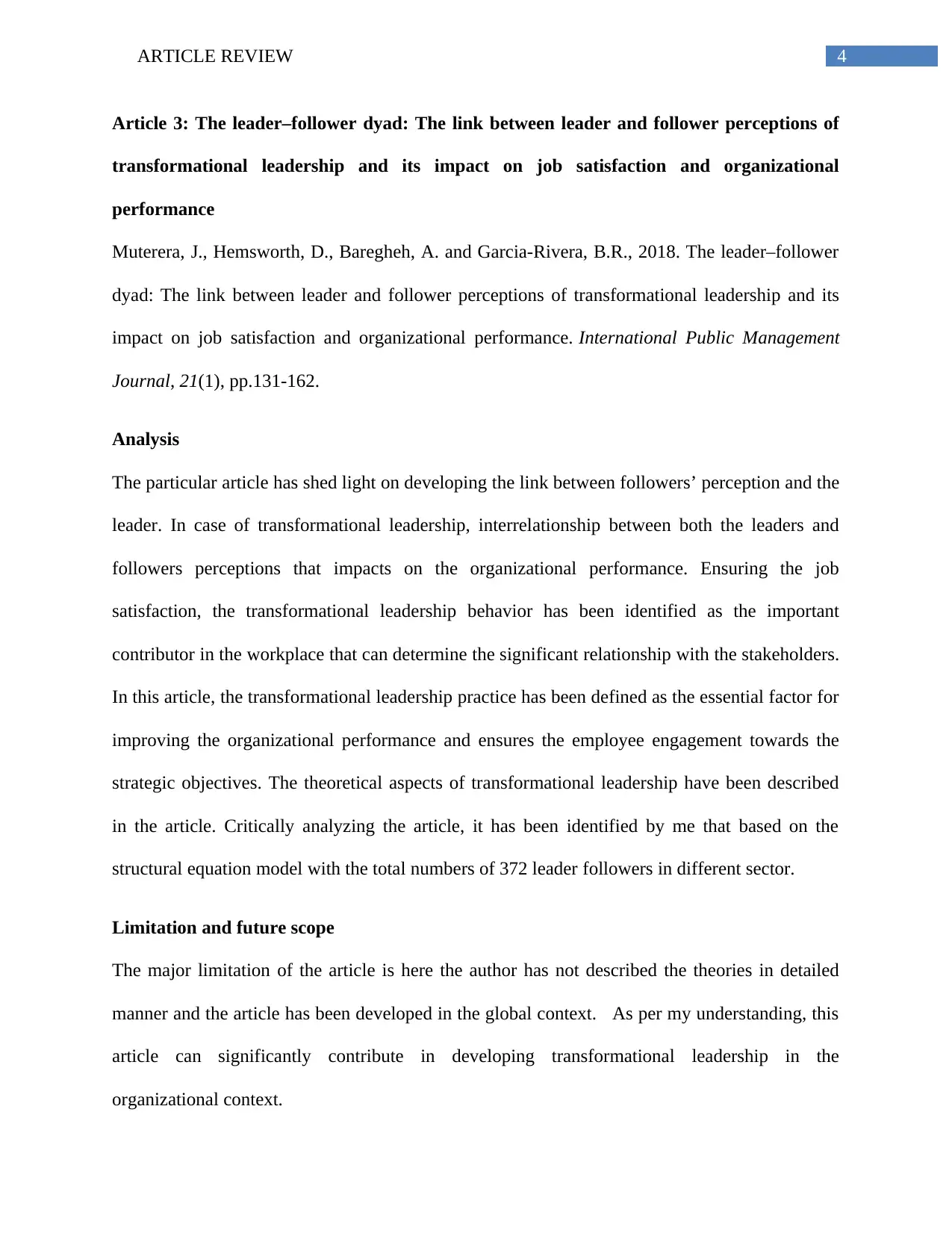
4ARTICLE REVIEW
Article 3: The leader–follower dyad: The link between leader and follower perceptions of
transformational leadership and its impact on job satisfaction and organizational
performance
Muterera, J., Hemsworth, D., Baregheh, A. and Garcia-Rivera, B.R., 2018. The leader–follower
dyad: The link between leader and follower perceptions of transformational leadership and its
impact on job satisfaction and organizational performance. International Public Management
Journal, 21(1), pp.131-162.
Analysis
The particular article has shed light on developing the link between followers’ perception and the
leader. In case of transformational leadership, interrelationship between both the leaders and
followers perceptions that impacts on the organizational performance. Ensuring the job
satisfaction, the transformational leadership behavior has been identified as the important
contributor in the workplace that can determine the significant relationship with the stakeholders.
In this article, the transformational leadership practice has been defined as the essential factor for
improving the organizational performance and ensures the employee engagement towards the
strategic objectives. The theoretical aspects of transformational leadership have been described
in the article. Critically analyzing the article, it has been identified by me that based on the
structural equation model with the total numbers of 372 leader followers in different sector.
Limitation and future scope
The major limitation of the article is here the author has not described the theories in detailed
manner and the article has been developed in the global context. As per my understanding, this
article can significantly contribute in developing transformational leadership in the
organizational context.
Article 3: The leader–follower dyad: The link between leader and follower perceptions of
transformational leadership and its impact on job satisfaction and organizational
performance
Muterera, J., Hemsworth, D., Baregheh, A. and Garcia-Rivera, B.R., 2018. The leader–follower
dyad: The link between leader and follower perceptions of transformational leadership and its
impact on job satisfaction and organizational performance. International Public Management
Journal, 21(1), pp.131-162.
Analysis
The particular article has shed light on developing the link between followers’ perception and the
leader. In case of transformational leadership, interrelationship between both the leaders and
followers perceptions that impacts on the organizational performance. Ensuring the job
satisfaction, the transformational leadership behavior has been identified as the important
contributor in the workplace that can determine the significant relationship with the stakeholders.
In this article, the transformational leadership practice has been defined as the essential factor for
improving the organizational performance and ensures the employee engagement towards the
strategic objectives. The theoretical aspects of transformational leadership have been described
in the article. Critically analyzing the article, it has been identified by me that based on the
structural equation model with the total numbers of 372 leader followers in different sector.
Limitation and future scope
The major limitation of the article is here the author has not described the theories in detailed
manner and the article has been developed in the global context. As per my understanding, this
article can significantly contribute in developing transformational leadership in the
organizational context.
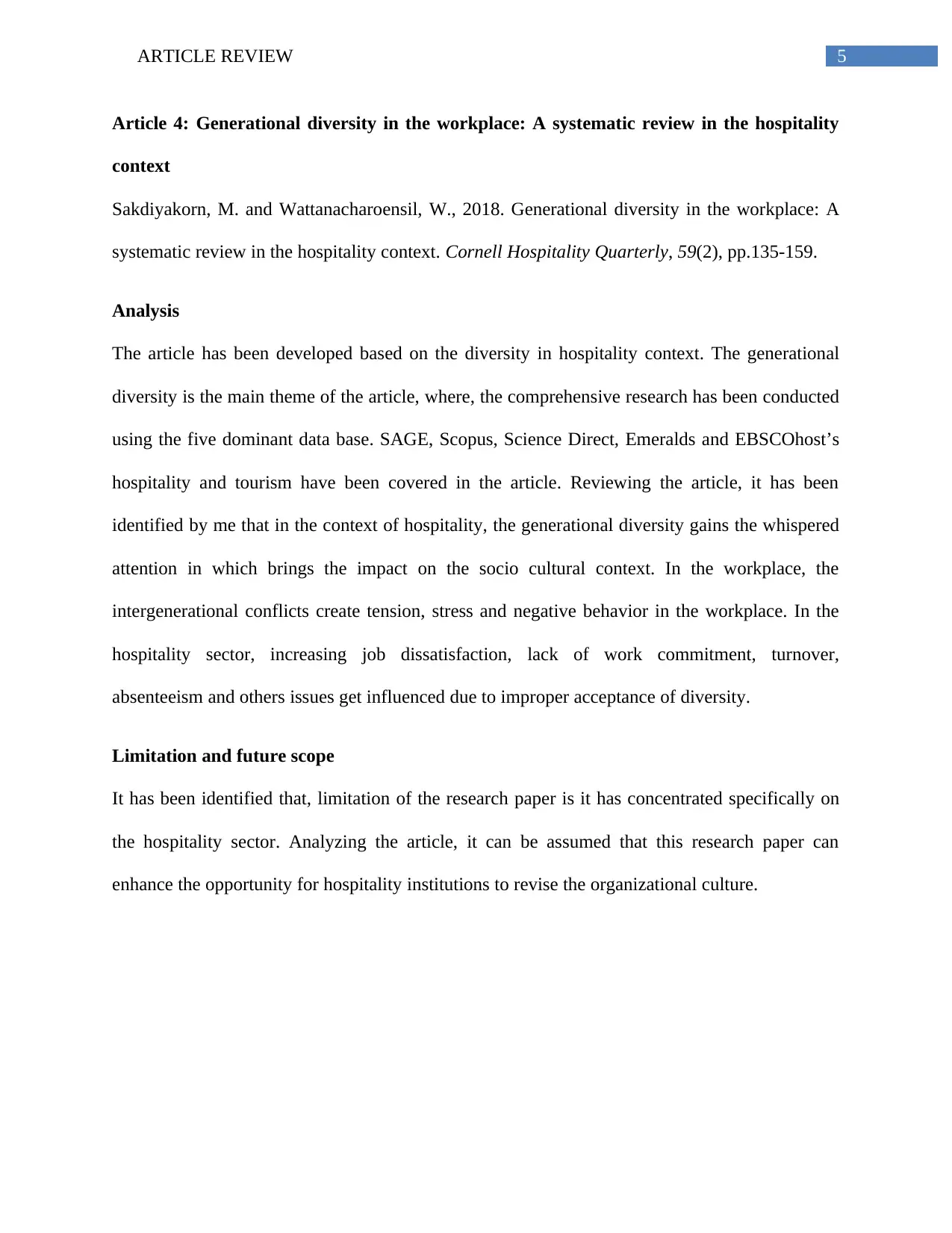
5ARTICLE REVIEW
Article 4: Generational diversity in the workplace: A systematic review in the hospitality
context
Sakdiyakorn, M. and Wattanacharoensil, W., 2018. Generational diversity in the workplace: A
systematic review in the hospitality context. Cornell Hospitality Quarterly, 59(2), pp.135-159.
Analysis
The article has been developed based on the diversity in hospitality context. The generational
diversity is the main theme of the article, where, the comprehensive research has been conducted
using the five dominant data base. SAGE, Scopus, Science Direct, Emeralds and EBSCOhost’s
hospitality and tourism have been covered in the article. Reviewing the article, it has been
identified by me that in the context of hospitality, the generational diversity gains the whispered
attention in which brings the impact on the socio cultural context. In the workplace, the
intergenerational conflicts create tension, stress and negative behavior in the workplace. In the
hospitality sector, increasing job dissatisfaction, lack of work commitment, turnover,
absenteeism and others issues get influenced due to improper acceptance of diversity.
Limitation and future scope
It has been identified that, limitation of the research paper is it has concentrated specifically on
the hospitality sector. Analyzing the article, it can be assumed that this research paper can
enhance the opportunity for hospitality institutions to revise the organizational culture.
Article 4: Generational diversity in the workplace: A systematic review in the hospitality
context
Sakdiyakorn, M. and Wattanacharoensil, W., 2018. Generational diversity in the workplace: A
systematic review in the hospitality context. Cornell Hospitality Quarterly, 59(2), pp.135-159.
Analysis
The article has been developed based on the diversity in hospitality context. The generational
diversity is the main theme of the article, where, the comprehensive research has been conducted
using the five dominant data base. SAGE, Scopus, Science Direct, Emeralds and EBSCOhost’s
hospitality and tourism have been covered in the article. Reviewing the article, it has been
identified by me that in the context of hospitality, the generational diversity gains the whispered
attention in which brings the impact on the socio cultural context. In the workplace, the
intergenerational conflicts create tension, stress and negative behavior in the workplace. In the
hospitality sector, increasing job dissatisfaction, lack of work commitment, turnover,
absenteeism and others issues get influenced due to improper acceptance of diversity.
Limitation and future scope
It has been identified that, limitation of the research paper is it has concentrated specifically on
the hospitality sector. Analyzing the article, it can be assumed that this research paper can
enhance the opportunity for hospitality institutions to revise the organizational culture.
⊘ This is a preview!⊘
Do you want full access?
Subscribe today to unlock all pages.

Trusted by 1+ million students worldwide
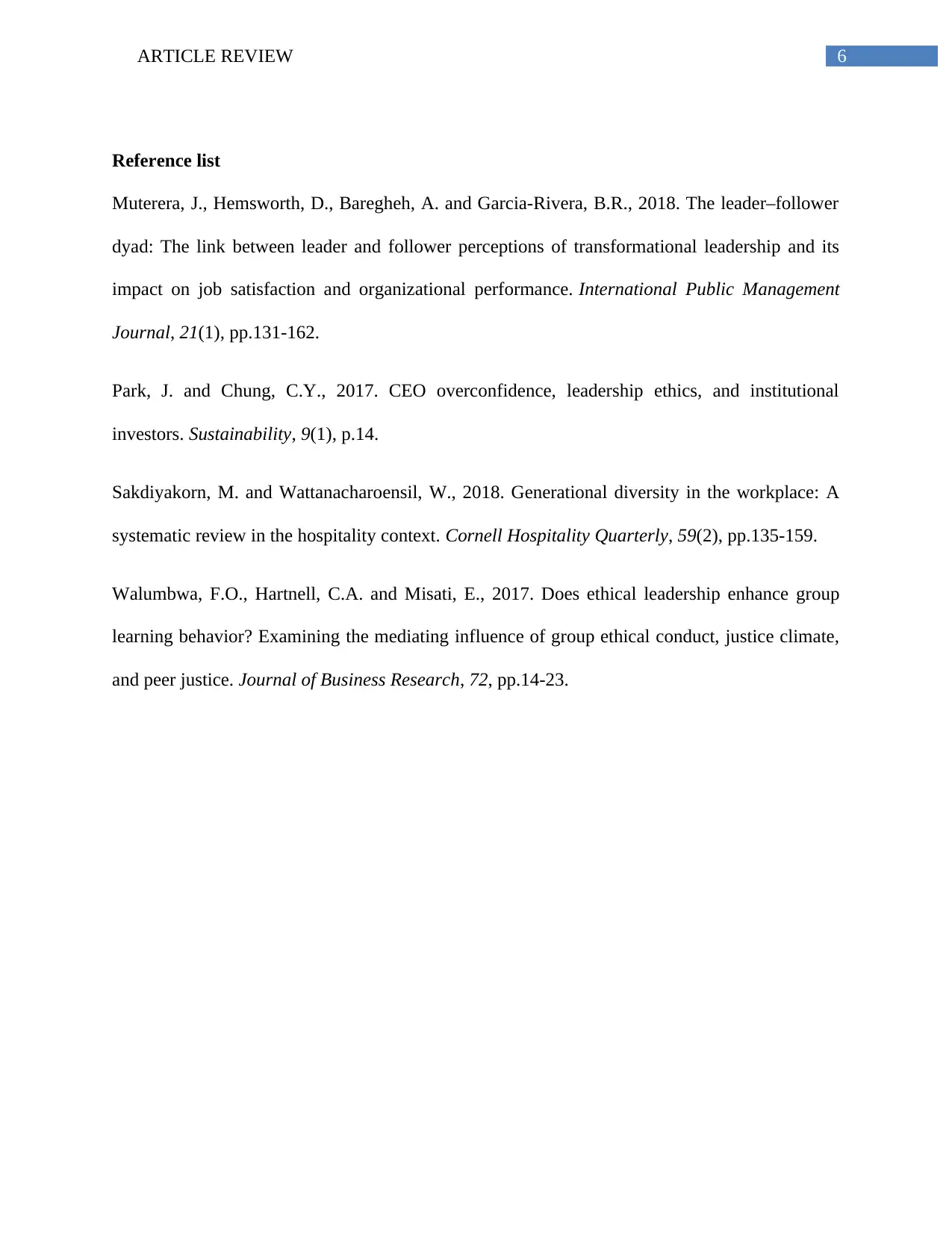
6ARTICLE REVIEW
Reference list
Muterera, J., Hemsworth, D., Baregheh, A. and Garcia-Rivera, B.R., 2018. The leader–follower
dyad: The link between leader and follower perceptions of transformational leadership and its
impact on job satisfaction and organizational performance. International Public Management
Journal, 21(1), pp.131-162.
Park, J. and Chung, C.Y., 2017. CEO overconfidence, leadership ethics, and institutional
investors. Sustainability, 9(1), p.14.
Sakdiyakorn, M. and Wattanacharoensil, W., 2018. Generational diversity in the workplace: A
systematic review in the hospitality context. Cornell Hospitality Quarterly, 59(2), pp.135-159.
Walumbwa, F.O., Hartnell, C.A. and Misati, E., 2017. Does ethical leadership enhance group
learning behavior? Examining the mediating influence of group ethical conduct, justice climate,
and peer justice. Journal of Business Research, 72, pp.14-23.
Reference list
Muterera, J., Hemsworth, D., Baregheh, A. and Garcia-Rivera, B.R., 2018. The leader–follower
dyad: The link between leader and follower perceptions of transformational leadership and its
impact on job satisfaction and organizational performance. International Public Management
Journal, 21(1), pp.131-162.
Park, J. and Chung, C.Y., 2017. CEO overconfidence, leadership ethics, and institutional
investors. Sustainability, 9(1), p.14.
Sakdiyakorn, M. and Wattanacharoensil, W., 2018. Generational diversity in the workplace: A
systematic review in the hospitality context. Cornell Hospitality Quarterly, 59(2), pp.135-159.
Walumbwa, F.O., Hartnell, C.A. and Misati, E., 2017. Does ethical leadership enhance group
learning behavior? Examining the mediating influence of group ethical conduct, justice climate,
and peer justice. Journal of Business Research, 72, pp.14-23.
1 out of 7
Related Documents
Your All-in-One AI-Powered Toolkit for Academic Success.
+13062052269
info@desklib.com
Available 24*7 on WhatsApp / Email
![[object Object]](/_next/static/media/star-bottom.7253800d.svg)
Unlock your academic potential
Copyright © 2020–2026 A2Z Services. All Rights Reserved. Developed and managed by ZUCOL.





